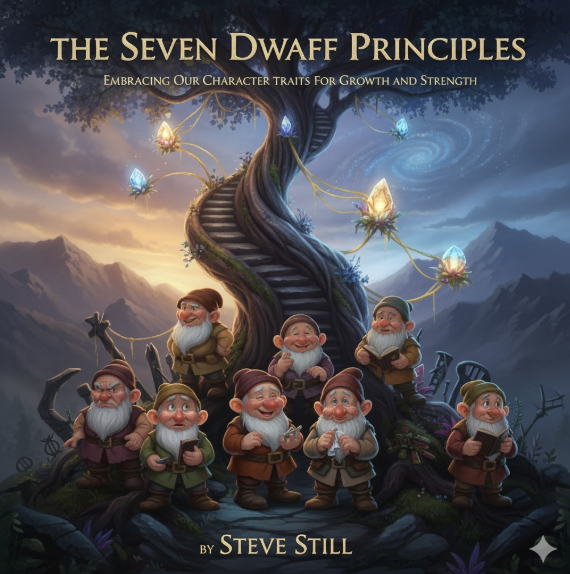
Introduction
It all began with a simple walk in the crisp, autumn air of late 2021. With my wife by my side, the conversation meandered as it often did, but on this day, it took an unexpected turn toward the biblical and the whimsical. For years, a concept had been bubbling in my professional life, an idea I came to call the "dwarf mentality" refined to the dwarf Principal and now, walking with the one person who knew me best, the idea took on a new clarity. It is, quite simply, a running tab of human ideas and behaviors that correspond to the seven dwarfs.
For years, whenever I would bring up the concept of the dwarf mentality, people would look at me as if I had completely lost it. They would dismiss it as a strange, quirky idea, unable to see the profound truth hidden beneath the fairytale surface. But it is real, and it is a fully descriptive—if not painfully honest—reflection of who we are, whether we admit it or not. We are all them. At any given moment, and depending on our circumstances and attitudes, we embody the personality of each of the seven dwarfs.
Within these pages, you will find a mirror reflecting the hidden parts of yourself. The world sees a veneer of competence and control, but a deeper truth resides within. Sometimes we are Grumpy, our hearts hardened by pride and resentment. Other times, we are Doc, striving for wisdom and order, but often missing the most essential truth. We all have moments of Sleepy-ness, our spiritual lives slumbering in complacency. We know the joy of Happy, but also the foolish immaturity of Dopey, and the spiritual shyness of Bashful. And who hasn't felt the sudden, embarrassing lack of control that Sneezy represents?
But this is not a book of condemnation; it is a book of grace and redemption, firmly rooted in Christian theology. The dwarf mentality is the unredeemed human condition, a collection of traits that separate us from our best, most Christ-like selves. But just as Snow White—a figure of purity and grace—entered the lives of the dwarfs and transformed their chaotic, undisciplined existence into a home, so too does the grace of God enter our lives and bring order to our brokenness. Our goal is not to eliminate our dwarf-like tendencies entirely, but to bring them under the submission of a higher, holy purpose. This book is an invitation to recognize these aspects of yourself and, through a renewed understanding of God's grace, to begin the journey toward spiritual maturity.
A biblical verse that effectively relates to your book's introduction is Romans 7:15. It captures the core conflict of the "dwarf mentality," the struggle between our sinful nature and our desire to do what is right.
"I do not understand what I do.
For what I want to do,
I do not do, but what I hate I do".
Romans 7:15 (NIV)
We often have an internal struggle a constant battle with our own selves, a shifting between different dwarf-like personalities (Grumpy, Sleepy, etc.) depending on our circumstances. Paul's words reflect this internal conflict, expressing his bewilderment at the gap between his intentions and his actions.
The undeniable truth: Your introduction notes that the "dwarf mentality... is fully descriptive of who we are; whether we admit it or not." This aligns with Paul's blunt confession. He doesn't deny his flawed nature, but lays it bare, acknowledging that his outward behavior is often at odds with his inner desires.
The unredeemed human condition: The verse, particularly in the context of Romans 7, highlights the power of the sinful nature (the "old self" in Ephesians), which persists even in those who desire to follow God. It perfectly illustrates the "unredeemed human condition" you mention, before grace transforms us.
By using this verse, you immediately ground your fairy tale metaphor in a familiar and profound Christian theological concept, creating a bridge for your readers between a whimsical story and a serious reflection on spiritual life.
When it comes to naming this book, I’ve found myself wrestling with two different but equally compelling titles: The Dwarf Principal and The Dwarf Principle. The choice between them is a deliberate one, a chance to set the tone and shape the journey we're about to take together. Each title invites you into the heart of this idea from a slightly different angle, so let me explain the path for each one.
On one hand, The Dwarf Principal has a more whimsical, intimate, and perhaps more direct feel. When I think of this title, I imagine the seven dwarfs not just as characters, but as the headmasters of a school we all attend—the school of the human heart. Each dwarf represents a core lesson we need to learn about ourselves: the Grumpy in us teaches us about pride, the Sleepy about spiritual laziness, and so on. It positions me, the author, as a fellow student who has been observing these lessons in my own life for years and is now inviting you to sit with me and explore them. This title is personal; it promises a fable-like quality that reminds us of the beloved tale, while gently revealing the profound, grace-filled truth that lies beneath. With this title, you would know you are embarking on a journey of personal reflection, guided by these very real, very human archetypes.
Then there is The Dwarf Principle. This title presents a more universal and systematic idea. It suggests that the "dwarf mentality" is not just a passing collection of behaviors, but a fundamental law of our human condition. If you read a book with this title, you might expect a more structured exploration of why we act the way we do, a framework that explains the underlying principles of our spiritual immaturity. This title feels more intellectual, more academic, and more comprehensive. It implies that I have spent my career not just observing, but formulating a definitive theory. It would frame the book as a blueprint for understanding our flawed nature, with the ultimate goal of bringing these ingrained principles under the authority of a higher spiritual law. It's less about the individual dwarfs and more about the universal rule they collectively represent.
In the end, both titles speak to the same profound truth I discovered on that walk with my wife. The key is in how we frame this truth for you, the reader. Do we enter through a story told by our eccentric headmasters, or do we enter through an organizing principle that promises clarity? Either way, the destination is the same: a deeper understanding of ourselves and a richer acceptance of God's grace.
Each dwarf represents a core lesson we need to learn about ourselves.
The Grumpy in us teaches us about pride and resentment, about the hardening of our heart against grace, seeing all of life through a lens of complaint and resentment.
The Sleepy in us speaks to our laziness, to the deep spiritual torpor that leaves us indifferent to the holy and the divine.
The Bashful in us reveals our deep-seated insecurity, that timidness that holds us back from true, vulnerable communion with others and with God.
The Sneezy in us reminds us of those uncontrollable moments of public embarrassment, the loss of composure that humbles us and reveals our lack of self-control.
The Dopey in us represents our foolishness, a more profound immaturity, a simplemindedness that makes us clumsy in our faith and easily led astray.
The Doc in us aspires to leadership and understanding, but often speaks a jumble of words, reminding us that knowledge alone is not enough and that our good intentions can sometimes be disorganized.
And the Happy in us shows us the potential for true, uninhibited spiritual joy, a testament to what is possible when grace truly takes hold.
Doc
-
Positive: Doc aspires to be the competent leader of the group. He desires order, wisdom, and rational behavior. As the most educated of the dwarfs, he has a responsible, fatherly nature and an eagerness to take charge, guiding his brothers toward a better, more organized life.
-
Negative: Doc's major flaw is that he is overwhelmed by the pressure of leadership. His anxiety makes him flustered and ineffective, leading to a loss of composure and an inability to clearly communicate his thoughts. His good intentions are often undermined by his own insecurities.
Grumpy
-
Positive: Grumpy's negativity often masks a deep-seated protectiveness. His suspicion and resistance to change can be a form of prudence, guarding against potential dangers. He is capable, intelligent, and often the first to take action, showing a core bravery beneath his scowl.
-
Negative: Grumpy's chronic pessimism and resentment poison his outlook, making him quick to anger and resistant to grace. His negativity is an active choice that fuels his bad mood, justifying his rudeness and resistance to the joy and optimism of others.
Happy
-
Positive: Happy embodies uninhibited joy, optimism, and generosity. He is the ray of sunshine in the group, actively promoting happiness and positive interaction through his singing and easygoing nature. His enthusiasm is contagious and serves as a vital counterbalance to Grumpy's negativity.
-
Negative: Happy’s positivity is unchecked. His cheerfulness is a form of escapism, a refusal to acknowledge brokenness.
Sleepy
-
Positive: Sleepy, beneath his drowsiness, is characterized by a calm, relaxed demeanor. His quiet nature is a sign of hidden wisdom; he is observant and logical, and sometimes the only one to grasp a situation with clarity.
-
Negative: Sleepy is very lazy and comfortable in his spiritual slumber.
Sneezy
-
Positive: Sneezy's experience with a daily affliction has given him empathy and a sense of humor. He is one of the friendlier dwarfs and understands what it is like to feel embarrassed. This allows him to be more compassionate toward others, particularly the more childlike Dopey.
-
Negative: Sneezy is defined by his condition, an affliction that can be disruptive and inconvenient, highlighting the shame we feel when we cannot perfectly manage ourselves in front of others.
Bashful
-
Positive: Bashful's shyness stems from a gentle and sensitive nature. He is kind, romantic, and deeply caring. His quietness can be a sign of humility and a thoughtful temperament, and he shows a unique passion for things he loves, like art.
-
Negative: Bashful is insecure and prevents him from embracing true vulnerability. He is so afraid of being seen and known that he hides his face and blushes, retreating from deeper connection.
Dopey
-
Positive: Dopey is defined by his childlike innocence, joyful nature, and unconditional love. As the most openly affectionate dwarf, his open heart and playful antics remind the others of a simple, unadulterated kind of happiness. His communication through gestures proves that words are not always necessary to convey love and emotion.
-
Negative: Dopey's immaturity can make him clumsy, foolish, and incompetent. While lovable, his lack of wisdom leaves him dependent and unable to contribute fully to the group.
Read the in-process draft here:
https://docs.google.com/document/d/1YxIk0qB_Zl8OLHrojzdg2aXb90tHp4ut9YGHhRE80fc/edit?usp=sharing









